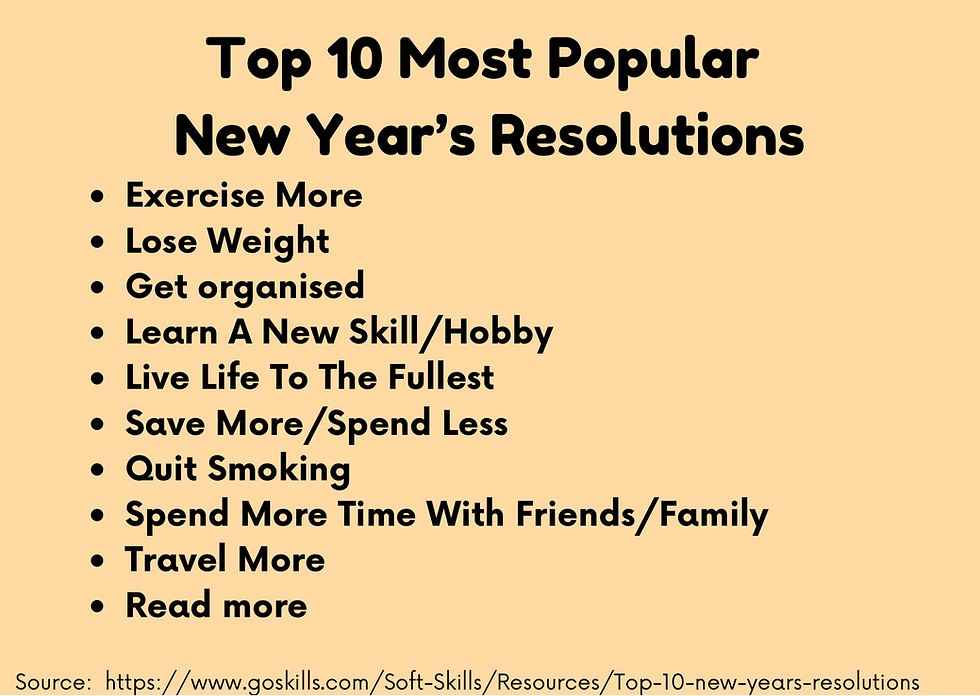5 Tips To Make A New Year's Resolution You Can Actually Stick To
- admin

- Dec 30, 2021
- 5 min read
As 2022 rapidly approaches, the time to make New Year's Resolutions is well and truly upon us. Making resolutions becomes something of a ritual every year, but studies have shown that as many as 80% of New Year's Resolutions fail. There are many theories as to why: there's too much pressure; people try and do too much too quickly; you don't make resolutions that you actually enjoy... but how can you make your 2022 resolutions stick?
Check out these tips and give them a go!

Focus On Actions, Not Outcomes
Some of the most regularly repeated resolutions are ones that centre around an outcome: 'lose weight', 'be more productive', 'be healthier' - but research has shown that when a goal is broad and undefined, it is much less likely to be achieved.
One way to tackle this is to make your resolution SMART - specific, measurable, attainable, realistic, and within a set time-frame.
However, if this all sounds a bit too corporate for you, another recommendation is just to pay attention to actions, rather than outcomes. For example, rather than setting the resolution to lose weight, your resolution should focus on the actions that you would need to do to lose weight, such as exercising a set number of times per week, or eating vegetables with every meal; rather than setting the resolution to be more productive, your resolution could be to wake up earlier (at a specific time) every day, or to read every day.
Break It Down Into Steps
Some people have a natural ability to adopt a new habit and just stick to it... But most people don't. One of the best ways to reach an overarching resolution is to break it down into steps. Do the first step until it feels natural (or at least sustainable) to you, then move onto the next one.
For example, if you currently wake up at 8am and your resolution is to wake up at 5am every day, you may struggle to cut your sleep time by multiple hours right off the bat. Your step-by-step plan could look something like this:
Step One: Build a night-time routine that involves turning phone off one hour before sleep
Step Two: Bring the time that you try to get to sleep forward to 10pm (or earlier) - lights out at this time!
Step Three: Move your alarm back by half an hour to 7:30am
Step Four: Move your alarm back to 7am
Step Five: Move your alarm back to 6:30am
Step Six: Move your alarm back to 6am
Step Seven: Move your alarm back to 5:30am
Step Eight: Move your alarm back to 5am

Remember Your 'Why'
If your resolution is something that you anticipate will be challenging for you, it may help you to think about the reasons that you are making it. Write out your 'why' and keep it handy for when you start to feel de-motivated.
You can make this practice a bit more fun by writing letters to your future self - telling them to keep going, or how proud you are of them for the actions that they've taken so far. Alternatively, you could pretend to be your future self who has achieved their resolution, writing to you to tell you how worthwhile it has been for them.
Find Some Accountability
A lack of accountability is one of the main issues that people have when it comes to keep to their New Year's Resolutions. It's hard to stay on track when nobody is checking in on you, or when nobody else seems to care whether you do it or not. Having an external source of accountability can make a huge difference - if your resolution is to exercise, try and find a gym buddy or join a sports club; if your goal is to read more, you could join a book club; if you want to learn a new skill, you can likely find a group or community online that will keep you aligned with your target.
Although the recommendation is to find accountability from real people, there are also countless apps and online tools that also seek to create it. For example, some people use social media scheduling tools to set a post (such as 'I have slept through my alarm this morning and I will pay £5 to each person who likes this post') to be published 15 minutes after their alarm goes off - the only way to stop it from being posted is to wake up and cancel it.

Go For A Non-Traditional Resolution
If you make resolutions every year, and every year, you give up on them by mid-February, it might be that traditional New Year's Resolutions just don't work for you. However, resolutions do not need to be a one-size-fits-all. Here are some alternative ways to make a resolution.
Pick a one-word theme
Inspired by Gretchen Rubin and the Happier podcast, you can choose a word that you want to be your overarching theme for the year. Coming up with your one-word theme is a fun and creative activity, and you can be as out there as you like - as long as it means something to you, that is what matters. Words chosen on the podcast are often multi-faceted and abstract - things like 'style', 'hot wheels', 'open', 'infrastructure', and 'butterfly'. Listen to the podcast where Gretchen Rubin explains this idea in more detail by clicking here.
Make a long list to pick from
The advice surrounding New Year's Resolutions tells us to not make too many resolutions - stick to a maximum of three to make them manageable and not too overwhelming. But this can feel limiting, and even constricting. An alternative approach is to make a long long list of actionable items (think 'get Christmas shopping done by the start of December' or 'organise my e-mail inbox' or 'throw a party' or 'run a 5k') you would like to achieve in the year, and then tell yourself that you would like to do 5 or 10 of them (to be decided as you go through the year).
Make monthly resolutions
A year is a long time to devote to any one resolution - working on the same thing for 12 months straight can become repetitive or boring, which makes it much harder to stick to. If you need a sense of urgency to prompt you to action, you may be better suited to making monthly resolutions. Four weeks just feels more manageable, and gives you the opportunity to shift your focus as the situation demands it.

Did you find this blogpost helpful? Leave a comment to let us know your thoughts, or share it with your friends and family so you can achieve your resolutions together!
Check out some related blog posts:
Sources:
Actionbuddy - The 7 Best Accountability Apps To Skyrocket Productivity
Gretchen Rubin - A Fun Way To Shape The New Year: Pick A One-Word Theme
Gretchen Rubin - 5 Ways To Make New Year's Resolutions More Attainable - And More Fun
Happier Podcast - Podcast 26: Pick A One-Word Theme For The Year, Take The First Step- And Paper Or Digital Calendar?
Michigan State University - Achieving Your Goals: An Evidence-Based Approach




Comentarios